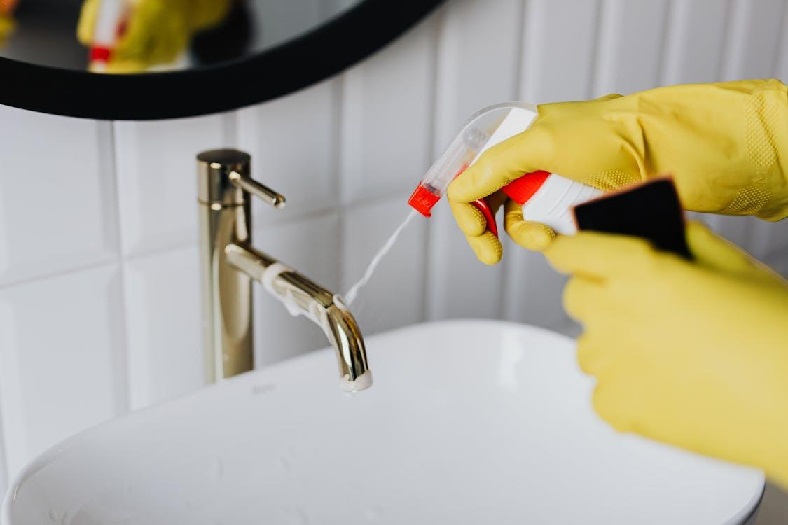
In the diverse landscapes of New York State, from the bustling streets of NYC to the serene expanses of the Adirondacks, homeowners face a variety of environmental challenges that can affect their properties. Whether it’s the humid summers that can encourage mold growth or the harsh winters that can cause pipes to freeze and burst, regular home maintenance is crucial. This guide outlines essential maintenance tasks that homeowners should perform regularly to keep their homes safe, efficient, and in good working order, no matter where they live.
1. Inspect and Clean Gutters
To prevent blockages that can lead to water backing up and damaging your roof or siding, it’s important to clean your gutters at least twice a year—once in the spring and once in the fall. During cleaning, check for signs of wear and tear such as holes or rust, and ensure all downspouts are directing water at least three feet away from your home’s foundation.
2. Check Plumbing Systems
Regular inspections of your plumbing system can help you catch leaks, rust, and corrosion before they cause serious damage. Look under sinks, check for water stains on ceilings, and listen for the sound of dripping or running water. Inspect hoses on appliances like washing machines and dishwashers for bulges or leaks, and replace them if necessary. For more complex issues or to ensure a thorough check, consider hiring professionals. If you’re in need of expert help, contacting the best Long Island plumbing company can provide you with top-notch service and peace of mind.
3. Test Smoke and Carbon Monoxide Detectors
Smoke and carbon monoxide detectors are critical for keeping your home and family safe. Test these devices monthly by pressing the test button, and replace batteries at least once a year or as needed. Remember, detectors have a limited lifespan—typically 10 years—so replace them before they fail to function. This simple check can be lifesaving, making it a non-negotiable part of your home maintenance routine.
4. Maintain HVAC Systems
Heating, ventilation, and air conditioning (HVAC) systems require regular maintenance to operate efficiently. This includes replacing or cleaning air filters every 30 to 90 days, depending on usage and type. Consider scheduling a professional HVAC inspection and tune-up before the heating and cooling seasons begin. This can help extend the life of your system, improve energy efficiency, and identify potential issues before they require costly repairs.
5. Check and Seal Windows and Doors
Ensuring that your windows and doors are properly sealed is an effective way to enhance energy efficiency in your home. Check for drafts by holding a candle near window and door frames on a windy day; if the flame flickers, there’s likely a draft. Apply caulk or weatherstripping to seal leaks, which can help reduce your heating and cooling bills. Additionally, inspect the frames and panes for signs of damage like cracks or rot, particularly after extreme weather, and address repairs promptly to maintain security and insulation.
6. Inspect the Roof
Regular roof inspections can prevent costly water damage by catching potential issues early. At least once a year, or following severe weather events, inspect your roof for missing, damaged, or aging shingles. Look for signs of wear around roof penetrations like chimneys and vents. If comfortable doing so, use a ladder to check for clear gutters and intact flashing. Otherwise, hiring a professional roofer can provide a more thorough assessment and address any repairs safely and effectively.
7. Care for Your Home’s Exterior
Maintaining the exterior of your home is key to preserving its appearance and structural integrity. Schedule time each year to power wash the siding, which can remove dirt and prevent mold growth. Check the paint or siding for chips or other damages, and make necessary repairs to protect against weather damage. For homes with wood elements, consider resealing or repainting every few years to guard against moisture and sun damage, ensuring your home continues to look its best.
8. Maintain the Water Heater
Water heaters need annual maintenance to operate efficiently and safely. This includes draining and flushing the tank to remove sediment build-up, which can impair your heater’s efficiency and shorten its lifespan. Check the pressure relief valve to ensure it’s functioning correctly to prevent potential leaks or bursts. If you have a tankless water heater, it may require descaling depending on water hardness and manufacturer recommendations. Regular maintenance can help extend the life of your water heater and reduce energy costs.
9. Service Major Appliances
Appliances like refrigerators, dryers, and dishwashers play crucial roles in your home and should be maintained to avoid breakdowns. Clean refrigerator coils to improve efficiency and check door seals to ensure they are airtight. For dryers, clean the lint trap after each use and periodically check the venting system to prevent fire hazards. Dishwashers should have their filters cleaned regularly to maintain performance. Keeping these appliances in good working order will enhance their functionality and longevity.
10. Landscape and Garden Upkeep
Regular landscaping not only boosts curb appeal but also prevents potential hazards. Keep trees trimmed to avoid overgrowth that could damage your home during storms. Manage garden beds by mulching and weeding, which protects plant health and maintains moisture. Consider xeriscaping or using native plants to reduce water usage and maintenance needs. Seasonal care, such as aerating the lawn and checking irrigation systems, ensures your outdoor space remains beautiful and functional.
Conclusion
Regular home maintenance is crucial for preserving the safety, efficiency, and aesthetic appeal of your home. Each of these tasks—from inspecting the roof to caring for your appliances—plays a vital role in avoiding costly repairs and maintaining your home’s value. By setting a regular schedule for these tasks, homeowners can ensure that their property remains in top condition, providing peace of mind and a comfortable living environment. Implement these tips to keep your home running smoothly, and enjoy the benefits of a well-maintained property.






